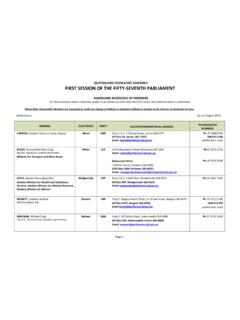Transcription of Private Equity I Healthcare REport - UC Berkeley School of ...
1 SOARING Private . Equity INVESTMENT. IN THE Healthcare . SECTOR: CONSOLIDATION. ACCELERATED, COMPETITION. UNDERMINED, AND. PATIENTS AT RISK. RICHARD M. SCHEFFLER. LAURA M. ALEXANDER. JAMES R. GODWIN. MAY 18, 2021. AUTHORS. Richard M. Scheffler is a Distinguished Professor of Health Economics and Public Policy in the Graduate Schools of Public Health and Goldman School of Public Policy at UC Berkeley and Director of the Nicholas C. Petris Center on Health Care Markets and Consumer Welfare ( ) at UC Berkeley . Corresponding author, Laura M. Alexander is Vice President of Policy, American Antitrust Institute (AAI). AAI is an independent non-pro t education, research, and advocacy organization.
2 Its mission is to advance the role of competition in the economy, protect consumers, and sustain the vitality of the antitrust laws. For more information, see James R. Godwin is a researcher at the Nicholas C. Petris Center on Health Care Markets and Consumer Welfare and a PhD Candidate in Health Policy & Management at the UCLA Fielding School of Public Health. ACKNOWLEDGEMENTS. We thank David Blumenthal, Commonwealth Fund; Larry Casalino, Weill Cornell Medicine Graduate School of Medicine Sciences; Marty Gaynor, Carnegie Mellon University's Heinz College; Paul Ginsburg, Brookings Institution;. Sherry Glied, New York University's Robert F.
3 Wagner Graduate School of Public Service; Tim Greaney, University of California, Hastings College of the Law; Charlene Harrington, School of Nursing at the University of California, San Francisco; Jaime King, Auckland Law School , University of Auckland; John Kwoka, Northeastern University's College of Social Sciences and Humanities; elizabeth Mitchell, Pacific Business Group on Health; Barak Richman, Duke University School of Law; Ericka Socker, Arnold Ventures; Isabel Tecu, Charles river Associates; and Emilio Varanini, California Office of the Attorney General for their helpful comments and suggestions. We would like to express our thanks and appreciation to Surina Khurana from the Petris Center at University of California, Berkeley , who made important contributions to every aspect of this REport .
4 Without her tireless effort, this REport would not have been possible. We are also grateful for the research assistance provided in preparing the case studies by Crystal Haryanto, Surina Khurana, Audrey Sadra, and Earnest Wang, undergraduate research assistants from the University of California, Berkeley . Finally, we thank Kloudin Yocoub and Mustafa Berk Baceci, research fellows at the American Antitrust Institute, and Crystal Haryanto, undergraduate research assistant from the University of California, Berkeley , for their assistance with legislative research and citations. All views expressed are solely those of the authors.
5 TABLE OF CONTENTS. SUMMARY OF MAJOR CONCLUSIONS 2. I. INTRODUCTION 4. II. WHY FOCUS ON Private Equity IN Healthcare ? 5. III. MEASURING Private Equity INVESTMENTS IN Healthcare 8. IV. Private Equity IN PRACTICE: FOUR CASE STUDIES OF Private 16. Equity INVESTMENTS IN Healthcare . CASE STUDY: JORDAN HEALTH SERVICES 16. CASE STUDY: ARDENT HEALTH SERVICES 19. CASE STUDY: PAR PHARMACEUTICALS COMPANIES 23. CASE STUDY: ADVANCED DERMATOLOGY AND COSMETIC SURGERY 26. V. IMPLICATIONS FROM THE CASE STUDIES 28. VII. THE ROAD AHEAD FOR Private Equity IN Healthcare : 35. FUTURE THREATS TO PATIENTS AND MARKETS. A. Healthcare QUALITY CONCERNS 35.
6 B. ANTITRUST AND COMPETITION CONCERNS 39. C. STATE AND FEDERAL LEGISLATION 50. VII. POLICY RECOMMENDATIONS 52. BIBLIOGRAPHY 58. APPENDIX 69. SUMMARY OF MAJOR CONCLUSIONS. Private Equity investment in Healthcare has grown dramatically over the last decade. Estimated annual deal values have gone from $ billion in 2010 to billion in 2019, for a total of approximately $750 billion over the last decade. Still, we expect that this rate will only increase in coming years. This explosive growth is being driven by a perfect storm of projected increases in Healthcare spending, tremendous stores of uninvested capital already dedicated to Private Equity funds, and market disruption caused by the COVID-19 pandemic.
7 This investment is disproportionately directed at the outpatient care and home health markets. The Private Equity business model is fundamentally incompatible with sound Healthcare that serves patients. Private Equity funds, by design, are focused on short-term revenue generation and consolidation and not on the care and long-term wellbeing of patients. This in turn leads to pressure to prioritize revenue over quality of care, to overburden health care companies with debt, strip their assets, and put them at risk of long-term failure, and to engage in anticompetitive and unethical billing practices. Adding to the mounting evidence of the negative impact of Private Equity on Healthcare , two recent National Bureau of Economic Research studies of the nursing home and dialysis markets found that Private Equity ownership is correlated with worse health outcomes and higher prices.
8 Private Equity 's focus on short-term revenue generation and consolidation undermines competition and destabilizes health care markets. Private Equity companies seek to consolidate health care providers and companies not, primarily, to deliver higher quality Healthcare more efficiently, but to engage in financial arbitrage and to gather leverage that can be used to bargain against suppliers, payors, and patients. The result impacts stability and leads to more concentrated and less competitive Healthcare markets. Private Equity acts as an anti-maverick force in Healthcare markets, amplifying and accelerating concentration and anticompetitive practices.
9 Healthcare markets already face serious concentration and competition problems. Recent empirical work demonstrates why this makes Private Equity investment in Healthcare particularly dangerous to competition. Whereas mavericks counter concentration and anticompetitive tendencies in markets with their disruptive competition, Private Equity has the opposite effect in markets lacking competition; Private Equity supercharges existing market concentration and anticompetitive tendencies, as a sort of anti- maverick. Private Equity firms operate under the public and regulatory radar. Private Equity is, in a word, Private .
10 Most Private Equity acquisitions in Healthcare are not reportable to antitrust or financial regulatory authorities under current law. And, even where transactions are reportable, the complex structure of Private Equity funds obscures the competitive impact of those deals. As a result, Private Equity companies operate in Healthcare without any effective oversight. Private Equity INVESTMENTS SOARING IN Healthcare : CONSOLIDATION ACCELERATED, COMPETITION UNDERMINED, AND PATIENTS AT RISK. 2. Urgent action is needed to oversee, investigate and understand the impact of Private Equity in Healthcare on patients and markets.






